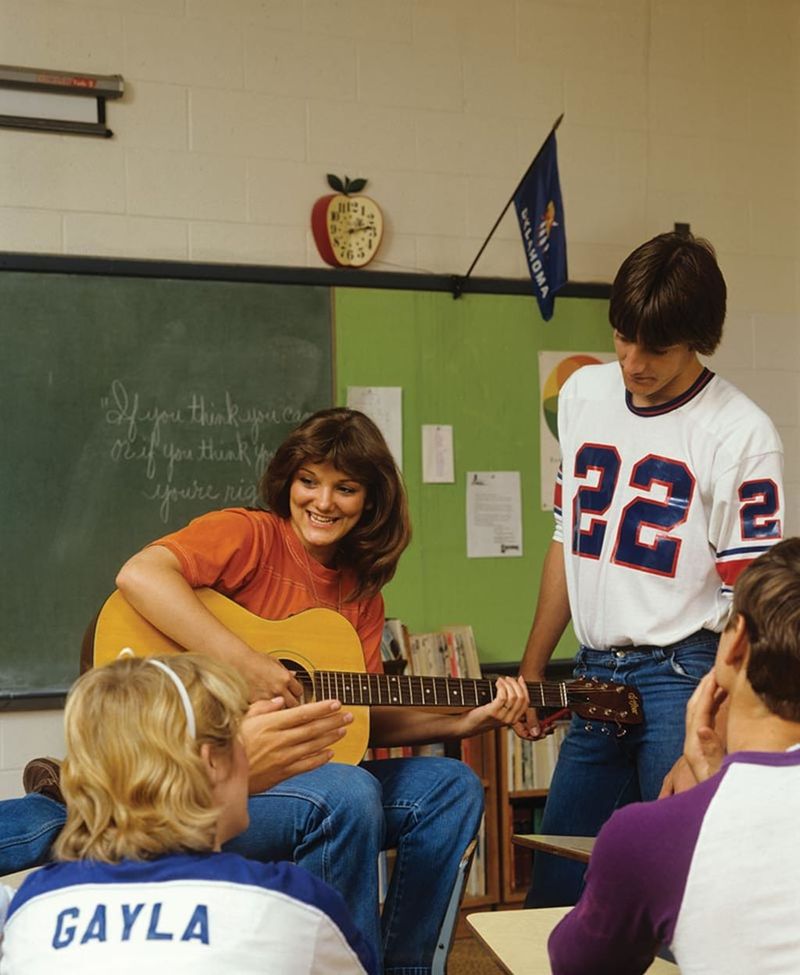Teachers in the 1970s had a unique way of instilling values and character in their students. Through memorable phrases and sayings, they taught us lessons that went beyond the classroom. These phrases were more than just words; they were principles that shaped us. Let’s explore the 11 sentences that left a lasting impact and helped build our character, one lesson at a time.
1. “Because I said so!”

In the ’70s, when a teacher said, “Because I said so!”, it wasn’t just about authority. It was a reminder that sometimes in life, explanations aren’t always given, yet respect and compliance are still necessary. This phrase taught us to trust those in charge, fostering a sense of discipline.
2. “Sit up straight!”

“Sit up straight!” was more than a posture correction. It symbolized attentiveness and respect. Teachers knew that a physical position could influence mental focus, and by encouraging us to maintain good posture, they were teaching us the importance of presence and engagement.
3. “Do it yourself.”

The phrase “Do it yourself” wasn’t just about fostering independence. It was an encouragement to develop problem-solving skills and confidence. Teachers knew that by allowing us to tackle challenges alone, we would become self-reliant and resourceful, qualities that would serve us well in life.
4. “If you can’t say something nice, don’t say anything at all.”

This phrase was about teaching kindness and empathy. In an era where words could hurt, teachers emphasized the importance of positive communication. By encouraging us to speak mindfully, they instilled a sense of compassion and respect for others’ feelings, making us more thoughtful individuals.
5. “Practice makes perfect.”

“Practice makes perfect” was a call to diligence and perseverance. Teachers in the ’70s knew that mastery came not from innate talent, but from consistent effort. This phrase taught us the value of hard work and the rewards of persistence, motivating us to pursue excellence in all endeavors.
6. “Patience is a virtue.”

In a world of instant gratification, the ’70s taught us that good things take time. “Patience is a virtue” was a reminder that waiting often yields the best results. Teachers instilled a sense of calm and endurance, teaching us to appreciate the journey, not just the destination.
7. “You have two ears and one mouth for a reason.”

This saying highlighted the importance of listening over speaking. Teachers encouraged us to listen actively, emphasizing that understanding others begins with listening. By promoting this balance, they taught us the value of empathy and thoughtful communication.
8. “Don’t put off until tomorrow what you can do today.”

Procrastination was not an option in the ’70s. This phrase instilled a strong work ethic, urging us to tackle tasks promptly. Teachers used it to teach the importance of responsibility, time management, and the satisfaction that comes from completing tasks efficiently.
9. “Actions speak louder than words.”

This timeless phrase taught us that true character is revealed through actions, not words. Teachers emphasized that integrity and sincerity are demonstrated through what we do, not what we say. It encouraged us to lead by example and act with intention and honesty.
10. “Never stop learning.”

Teachers inspired a lifelong love of learning with this phrase. They encouraged us to be curious and seek knowledge beyond the classroom walls. This mindset fostered intellectual growth and adaptability, preparing us for a world that constantly evolves. It was about embracing education as a continuous journey.
11. “Treat others the way you want to be treated.”

The Golden Rule was a staple in ’70s classrooms. It encouraged empathy and fairness, teaching us to consider others’ perspectives. Teachers used this principle to foster a community of respect and kindness, guiding us to build relationships based on mutual understanding and care.

Mother of three and a primary school teacher. I’ve always loved being around children and helping them, so I chose my path as a teacher. It is sometimes hectic with three children, but I am 100 percent into it and wouldn’t change it for anything in the world.

